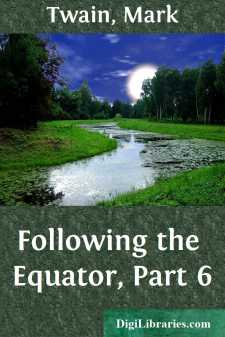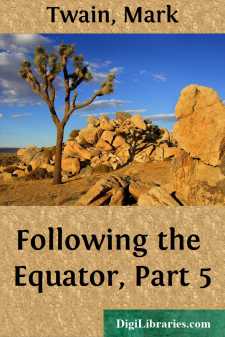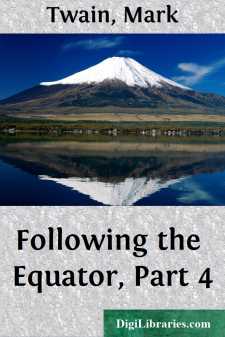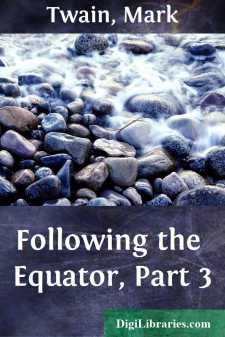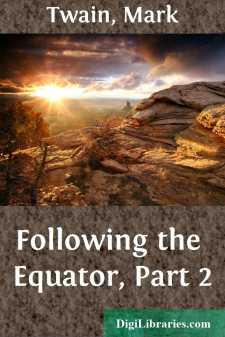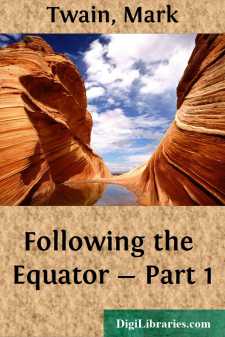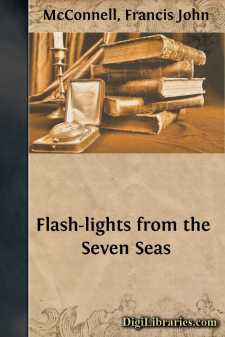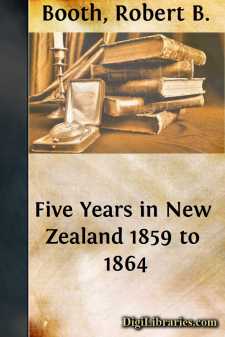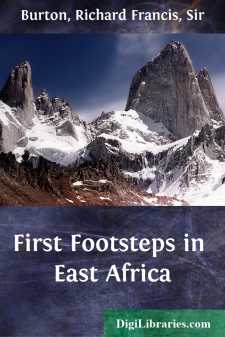Travel
- Africa 29
- Alaska 3
- Asia 46
- Australia & Oceania 26
- Canada 31
- Caribbean & West Indies 5
- Central America 1
- Europe 151
- General 39
- Maps & Road Atlases 1
- Mexico 10
- Middle East 18
- Polar Regions 7
- Reference 11
- Restaurants 1
- Russia 6
- South America 16
- United States 71
Travel Books
Sort by:
by:
Mark Twain
Let me make the superstitions of a nation and I care not who makes its laws or its songs either.—Pudd'nhead Wilson's New Calendar.Yes, the city of Benares is in effect just a big church, a religious hive, whose every cell is a temple, a shrine or a mosque, and whose every conceivable earthly and heavenly good is procurable under one roof, so to speak—a sort of Army and Navy Stores,...
more...
by:
Mark Twain
By trying we can easily learn to endure adversity. Another man's, I mean.—Pudd'nhead Wilson's New Calendar.You soon find your long-ago dreams of India rising in a sort of vague and luscious moonlight above the horizon-rim of your opaque consciousness, and softly lighting up a thousand forgotten details which were parts of a vision that had once been vivid to you when you were a boy,...
more...
by:
Mark Twain
—Pudd'nhead Wilson's New Calendar.We spent part of an afternoon and a night at sea, and reached Bluff, in New Zealand, early in the morning. Bluff is at the bottom of the middle island, and is away down south, nearly forty-seven degrees below the equator. It lies as far south of the line as Quebec lies north of it, and the climates of the two should be alike; but for some reason or other it...
more...
by:
Mark Twain
It is by the goodness of God that in our country we have those three unspeakably precious things: freedom of speech, freedom of conscience, and the prudence never to practice either of them.--Pudd'nhead Wilson's New Calendar.From diary: Mr. G. called. I had not seen him since Nauheim, Germany--several years ago; the time that the cholera broke out at Hamburg. We talked of the people we had...
more...
by:
Mark Twain
It is your human environment that makes climate.—Pudd'nhead Wilson's New Calendar.Sept. 15—Night. Close to Australia now. Sydney 50 miles distant. That note recalls an experience. The passengers were sent for, to come up in the bow and see a fine sight. It was very dark. One could not follow with the eye the surface of the sea more than fifty yards in any direction it dimmed away and...
more...
by:
Mark Twain
A man may have no bad habits and have worse.—Pudd'nhead Wilson's New Calendar. The starting point of this lecturing-trip around the world was Paris, where we had been living a year or two. We sailed for America, and there made certain preparations. This took but little time. Two members of my family elected to go with me. Also a carbuncle. The dictionary says a carbuncle is a kind of jewel....
more...
FOREWORD That vast stretch of opal islands; jade continents; sapphire seas of strange sunsets; mysterious masses of brown-skinned humanity; brown-eyed, full-breasted, full-lipped and full-hipped women; which we call the Orient, can only be caught by the photographer's art in flash-light pictures. It is like a photograph taken in the night. It cannot be clear cut. It cannot have clean outlines. It...
more...
by:
Robert B. Booth
CHAPTER I. How I Came to Emigrate. I was one of a family of nine, of which four were sons. My eldest brother was destined for the Church; the second had entered a mercantile house in Liverpool; and I, who was third on the list, it was my father's intention, should be educated for the Royal Engineers, and at the time my story opens I was prosecuting my studies for admission to the Academy at...
more...
LETTER I. VOYAGE.— ARRIVAL AT NEW YORK.— BURNING OF QUARANTINE BUILDINGS.— CABLE REJOICINGS.— DESCRIPTION OF THE TOWN. New York, September 3, 1858. We landed here yesterday afternoon, at about six o'clock, after a very prosperous voyage; and, as the Southampton mail goes to-morrow, I must begin this letter to you to-night. I had fully intended writing to you daily during the voyage, but I...
more...
PREFACE. Averse to writing, as well as to reading, diffuse Prolegomena, the author finds himself compelled to relate, at some length, the circumstances which led to the subject of these pages. In May 1849, the late Vice-Admiral Sir Charles Malcolm, formerly Superintendent of the Indian Navy, in conjunction with Mr. William John Hamilton, then President of the Royal Geographical Society of Great...
more...


